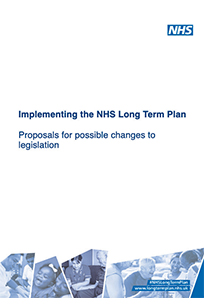Association unconvinced by need for new capital spending limits for FTs
The HFMA is not convinced that setting spending limits for foundation trusts is the solution to managing scarce capital resources across the healthcare system in England.
The association disagreed with the proposal as part of its response to the NHS England and NHS Improvement consultation on possible legislative changes to support the NHS long-term plan. The system leaders’ argument for the change is that a more co-ordinated and collaborative approach is needed to planning capital investment.
There are currently no mechanisms to set capital spending for foundation trusts – they are free to use their internally generated resources or borrow to fund capital programmes.
As the Department of Health and Social Care (DHSC) pointed out in its annual report and accounts for 2017/18, the £0.4bn underspend against the capital departmental expenditure limit ‘arose predominantly due to NHS providers’ capital spend being significantly lower than they planned and forecast’.
However, according to the consultation document, the lack of foundation trust limits ‘leads to situations where, because of uncertainty or unpredictability associated with capital spending by foundation trusts, it becomes necessary to constrain or delay capital spending by non-foundation trusts that may be more urgent or address higher priority needs’.
It added that this limits the centre’s ability to work with health systems to improve capital planning and it increases the risk that the DHSC and the NHS collectively could exceed the limits prescribed by Parliament.
NHS England and NHS Improvement acknowledged that the ability to build up reserves for capital projects is viewed as a ‘helpful freedom’. But they said that the power to set annual spending limits for foundation trusts – which already exist for NHS trusts – would need to be exercised carefully. And foundation trusts would not ultimately be prevented from using reserves to support capital investment; rather, it would just be the timing of such investments that could be affected.

The HFMA’s response to the consultation disagreed with the proposed change on the grounds that spending limits only addressed one part of the problem and may not necessarily avoid the underspend incurred against CDEL in 2017/18, which resulted in much-needed resource lost to the NHS.
The association acknowledged that there is ‘a dwindling number of NHS foundation trusts that have internal resources’ and spending limits would stop these providers from spending them without central approval.
But it stated that the key constraint for many provider bodies was simply access to resources to support capital projects.
‘We would be more supportive of the extension of NHS Improvement’s powers if it was linked to the availability of funding so that capital programmes can be delivered on a timely basis,’ its response said.
The association also queried whether a change in legislation was even needed to develop agreed annual capital spending limits for foundation trusts. The current control total arrangements operate alongside the existing legislative regime and neither NHS trusts nor foundation trusts have a revenue resource limit, it pointed out.
The HFMA did not comment on incentive schemes used in the last two years encouraging surplus trusts to commit to increased surplus levels in return for additional bonuses from unallocated sustainability funds at year end.
However, there have been comments elsewhere about the tension between one policy initiative that enables trusts to increase surpluses that could be used for capital programmes in subsequent years and a separate policy initiative that seeks to limit the flexibility of when these reserves can be used.HFMA on legislation
The HFMA backed proposals to remove the Competition and Market Authority function to review mergers involving foundation trusts. It said the introduction of integrated care systems meant that competition was no longer the mechanism used to drive improvements in care.
The association agreed with proposals to relax procurement requirements when commissioners are putting services in place. However it raised concerns about the proposed new best value test that commissioners would be subject to. More details were needed about how this might operate.
The association also strongly supported proposals to enable adjustments to tariff provisions to be made within a tariff period (subject to consultation). This would be particularly important when a multi-year tariff is set.
Related content
The Institute’s annual costing conference provides the NHS with the latest developments and guidance in NHS costing.
The value masterclass shares examples of organisations and systems that have pursued a value-driven approach and the results they have achieved.